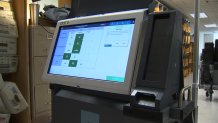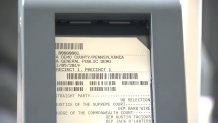What to Know
- The first voting machines arrived on Monday. Eventually, 3,800 new machines will replace the old ones, starting with the November election.
- They have large, computerized touchscreens on which voters tap their choices, and also include a paper slip that records each ballot cast.
- The Commissioners' office is forging ahead with the machines despite criticism and concerns over transparency and security.
Philadelphia's first new voting machines in nearly 20 years arrived Monday following months of debate over their security, accessibility and the process by which they were chosen.
New machines were required of all counties by Pennsylvania ahead of the presidential election next year. Russian meddling in the 2016 election and ongoing concerns over voters' rights put a keen focus on the selection process by the three City Commissioners in recent months.
Eighty-three of an eventual 3,800 new machines, manufactured by Nebraska-based ES&S, are being tested at the City Commissioners' offices, with some of them expected to be shown to the public by the summer.
All told, replacing the old voting machines could cost up to $60 million. The new versions are the first for Philadelphia since 2002. Prior to that, the city used the same machines for more than 30 years.

City Commissioner Lisa Deeley, who gave NBC10 a first look Tuesday at how the new large, touchscreen machines work, said the city's 8,500 poll workers will be trained in the summer. The machines will be used for the first time in the November general municipal election.
Local
Breaking news and the stories that matter to your neighborhood.
Deeley's demonstration was the first for the ES&S ExpressVote XL machines since the City Commissioners, who oversee elections, chose the company in February following a bid process.
Critics have accused the Commissioners of lacking transparency and claim the touchscreen, paper-audit machines are not as secure from hacking as another certified option that requires voters to fill out a handwritten ballot, which is then scanned into a voting machine.
"I believe this is the best system for Philadelphia voters," Deeley said as she cast some demo ballots through one of the machines. "These ensure everyone can vote on the same system. And it provides a full-face ballot screen, which Philadelphians are accustomed to."
Deeley, who is running for her elected Commissioner position against 12 other Democrats in the May 21 primary, said both accessibility and familiarity were key components in choosing ES&S's touchscreen machine.
In addition to a computerized touchscreen, the machine requires each voter to insert a paper slip into the right side before casting their vote.
Once a voter chooses his or her candidates and ballot question answers on the touchscreen, they are then prompted to cast their ballot. The machine then prints out their selections on the paper slip for the voter to make a final check.

If the paper ballot is correct, the voter officially casts the ballot. The machine registers the voters electronic responses and deposits the paper ballot into a locked container inside.
Those paper ballots can be audited in ballot challenges.
The timing of the selection of the ES&S machines has raised concerns among some members of the public. Deeley and another City Commissioner running for re-election, Republican Al Schmidt, chose the company — which also has its voting machines in use in Delaware and New Jersey — at a Feb. 20 meeting. The next day, they recused themselves from further deliberation over the procurement of the machines.
State law requires elected Commissioners who are campaigning for office from being involved in decision-making related to an upcoming election.
The third commissioner, Anthony Clark, is not running for re-election. Clark is presiding over ongoing Commissioner meetings along with two Philadelphia judges who were chosen by the city's president judge as replacements for Deeley and Schmidt.
Despite ongoing protests from some members of the public, as well as City Controller Rebecca Rhynhart, Deeley said the new ES&S ExpressVote XL machines will be utilized in the November elections — and future elections.
The old machines will be decommissioned following the May primary.
On April 1, Rhynhart subpoenaed records from the Commissioners' offices related to the selection process. As of Tuesday, the subpoena remains in contention between attorneys with the city Law Department and the Controller's office, according to an official familiar with the litigation.
Rhynhart indicated in a statement she will continue to investigate the process that led to the selection of ES&S ExpressVote XL machines.
"The delivery of these 83 machines before a contract has been signed or funding approved by City Council shows just how broken this process has been, every step of the way," she said. "I’m deeply concerned about the legality of this process, and as City Controller, I will not release $1 of payment while these questions go unanswered."



